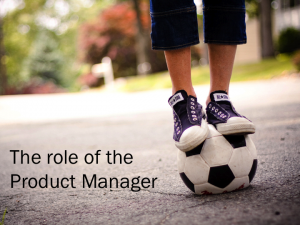 About a week ago I had a discussion with a colleague in our development team about the new product development process we rolled out a few months ago. One of the words he used to describe the new process is fair.
About a week ago I had a discussion with a colleague in our development team about the new product development process we rolled out a few months ago. One of the words he used to describe the new process is fair.
It was a passing comment and I didn’t really think much of it at the time, but since then I keep going back to that conversation, and the importance of fairness in the product management profession.
Loads of articles have already been written about the characteristics of a good Product Manager (see the end of this post for links to some of them). They’re all fantastic, and I go back to them constantly when I’m in the hiring process or looking for personal development areas. But I’ve never been able to find the one characteristic that I think a PM simply cannot do without. I now think that fairness is that characteristic. Here’s why.
The role of fairness in effective product management
Let’s look at one definition of the word fair:
fair. adjective. free from favoritism or self-interest or bias or deception.
Free from favoritism
One of the fastest ways to become ineffective in a PM organisation is to start playing favorites with a particular internal group, product line, or user base. As soon as people sense that you are not looking at all ideas and input equally and fairly, a lack of trust inevitably follows. And without trust, you’ll have to work a lot harder (and longer) to bring people along for the ride on your roadmap.
Free from self-interest
If you start doing things purely with reasons like “because I want to” or “because I’m being measured by this metric,” that same lack of trust happens very quickly. You cannot be effective by nursing your own pet projects and ignoring all the other needs around you.
Free from bias
This often happens when PM’s get news they don’t want to hear — especially from the user research team. If something doesn’t test well, don’t make up reasons why you are right and the users are wrong. Do the right thing and realign the design.
One of the hardest skills for a PM to learn is to take their own emotions and feelings out of the equation when it comes to decision making. Yes, a lot of gut feel goes into a product vision, but that cannot be based on personal preferences or preconceived ideas.
Free from deception
This one seems obvious, but you see it often, especially when it comes to metrics and assessment. Don’t ignore/distort negative data or make a problem someone else’s fault. The PM’s job is to own a product — and this means owning its successes and its failures. You’ll gain trust and respect if you not only claim the successes, but also acknowledge the failures and commit to do it better next time.
The elements of fairness in product development
The PM role is often referred to as “the great diplomat,” and with good reason. It is our responsibility to balance a variety of needs from inside and outside the business, and somehow turn that into a roadmap that delivers business value as well as meets user needs. A focus on fairness accomplishes that goal:
- Fairness to users. Approach users with respect, openness and transparency. Understand their needs, and explain to them when you’re doing something that makes it more difficult for them to meet those needs. (Don’t be like Twitter and hide behind reasons like “consistent user experience.”)
- Fairness to the business. Do everything you can to understand the needs of marketing, merchandising, customer support, etc. Pull them into the planning process, be clear about how projects are prioritised, and help them adjust to that process so that they can define their project goals in the right way to get on the roadmap.
- Fairness to technology. Don’t force the development team to make the technology do things it’s not capable of doing. Understand the technical debt in the organisation, and work actively to make those improvements part of regular development cycles.
A lot of this comes naturally in good product managers, but we need to be conscious of it every day. Fairness is a table stakes characteristic for an effective product manager. If you do it right, the real work of building great product can begin. But if you don’t, you’re dead in the water, working with a team that has no reason to trust that you’re doing the right thing.
More characteristics of good product managers: